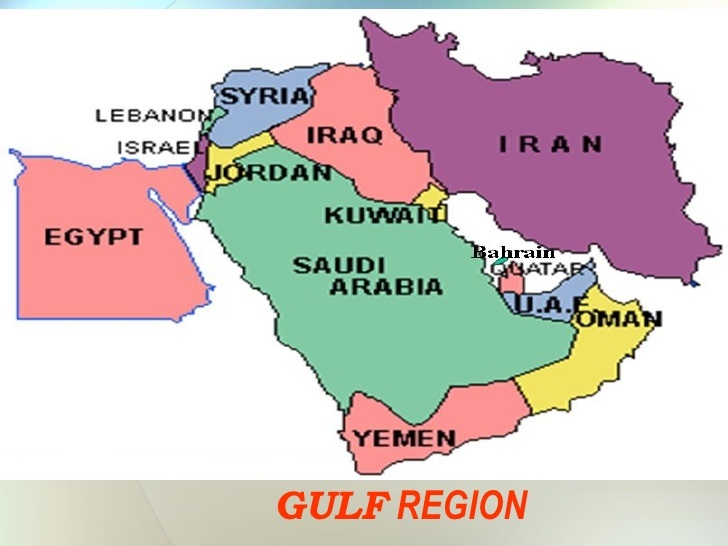What is the issue?
- The Gulf States are increasingly taking responsibility for managing the regional order.
- With this, India could not afford to take a purely bilateral approach but must adopt a more integrated regional strategy.
How is India-Gulf relations at present?
- India’s relations with the key Gulf countries have never been as good as they are today.
- Trade - The Gulf is among India’s top trading partners.
- The deepening energy interdependence is marked by growing volumes of energy imports into India.
- There is also the prospect of substantive investments from the Gulf into the Indian hydrocarbon sector.
- The number of Indian migrant workers in the region stands at more than 7 million.

- Security - A high-level engagement between India and the Gulf has blossomed in recent years.
- Top leaders from both sides have travelled frequently to each other regions.
- The expansion of the political engagement has been matched by the growing security cooperation, especially on counter-terrorism.
- India and its Gulf partners are also taking tentative steps towards defence cooperation.
What is the drawback?
- India's political neglect of the Gulf has certainly ended during the last few years.
- But India’s relations with the Gulf have been constrained by focus only on the bilateral relations.
- India is paying too little attention to the growing weight of the Gulf in regional affairs.
- It is also not attentive to the strategic possibilities that the Gulf's regional affairs open up for India.
What are the recent developments in the Gulf?
- Saudi Arabia - Saudi Arabia has long been a pivotal state in the Gulf region.
- It is one of the world’s largest petroleum reserves and is capable of modulating its oil production.
- By this, it has played a critical role in shaping the world energy markets since the 1970s.
- Also, as the home to Mecca and Medina, Saudi Arabia has a unique place in the Islamic world.
- Since the late 1960s, it has exercised significant political influence in the evolution of the Middle East.
- UAE - The rise of the UAE, in contrast to Saudi Arabia, has been less noticed.
- But UAE has turned into a strategic actor of consequence in the Middle East and beyond.
- The events of 9/11 and the Arab Spring have convinced the UAE that it must act boldly.
- It is now inclined to generate the capabilities to survive amidst the regional turbulence.
- E.g. It's defence budget is reportedly around $22 billion - nearly 40% of India’s defence spending.
- Notably, the UAE was the fourth-largest importer of weapons during 2013-17.
- The UAE is also a major player in the global logistics market, with the development of Dubai as a major port and aviation hub.
- It is now striving to emerge as a centre of art, higher education and technological innovation.
- As the home to multiple nationalities from around the world, it has become a small but important cosmopolitan centre.
What does this offer for India?
- If India looks beyond the bilateral, it will find two very important axes of potential partnerships in the Middle East.
- “Moderate Arab centre” - The UAE believes that only a coalition of moderate Arab states can move the region out of its current deeply troubled state.
- It sees the construction of such a core around Egypt and Saudi Arabia.
- So the UAE leadership has made the construction of a moderate bloc in the region its highest regional priority.
- It also believes that certain values which helped the Emirates succeed can be extended to other parts of the Middle East.
- These are cultural openness, religious tolerance, women’s empowerment, and economic opportunities for younger people.
- There are many obstacles to the realisation of this ambitious project, especially the deepening divisions within the Gulf.
- But the idea of a moderate Arab centre should resonate deeply with India’s natural ethos.
- India's traditional empathy for modernising forces in the Arab world should favour this.
- Indian Ocean Region - Another potential area is the growing impact of the Gulf countries in the Indian Ocean region. E.g. the Horn of Africa.
- The recent success of the UAE and Saudi Arabia in brokering peace between Ethiopia and Eritrea underlines the positive role of the Gulf in Africa.
- Alliances, military bases, interventions and peace-making have long been considered as the preserve of great powers.
- But Gulf countries are now bringing a combination of financial resources and political will to shape the geopolitics.
- Some of the Gulf countries like the UAE are eager to collaborate with India on development assistance.
- They show interests in the construction of strategic infrastructure in the Indian Ocean littoral.
- So it is essential that India makes the best out of this opportunity.
- India thus needs an integrated regional strategy to secure its ever-rising stakes in the Middle East and the Western Indian Ocean.
Source: Indian Express
